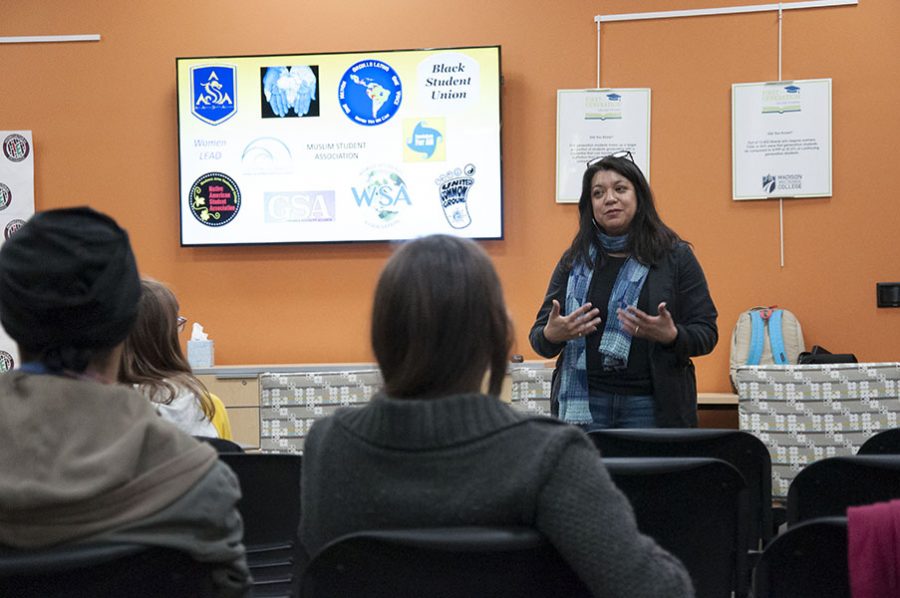ACLU visits Truax to talk poetry
Angie Trudell-Vasquez presents a workshop, “Politics, Power and Poetry,” at the Intercultural Exchange on the Truax Campus on March 21.
April 4, 2018
Madison College’s Yahara Journal hosted an intriguing, hands-on poetry workshop called Politics, Power and Poetry on Wednesday, March 21. To facilitate this workshop, they had invited Angie Trudell-Vasquez, Operations Coordinator for End Domestic Abuse, formerly an ACLU Specialist.
This workshop has been presented in Washington D.C. and various festivals prior to now. Trudell-Vasquez facilitated this workshop for groups ranging from preschool to college.
“I developed this and this my baby. I feel I am the best person to teach it,” said Trudell-Vasquez. In addition to her own, Trudell-Vasquez has published several of other people’s books as well. She strives to provide tools to help with the mechanics of writing poetry.
Trudell-Vasquez wanted this workshop to talk about, “The civil rights, civil liberties, the constitution and the bill of rights and how we’ve been negotiating it since the beginning of this country and how does it tie into art and poetry.”
She said the founding document of our country is known to be a wonderful piece of paper that doesn’t mean much to people anymore. It was intended for white males with privilege, she said but didn’t include women or people of color, and there were a lot of people left out.
“We’ve been pushing from the very beginning for the dream to come true,” she said. “Our country has a long history of struggle and people trying to exercise their rights.”
Trudell-Vasquez thinks that is a beautiful thing.
Poetry, however, is so much more than an assignment you get in high school. It is found to be very mindful and hard to maintain.
“Poetry has been used to inspire and rally people around civil liberties and civil rights since the early days of the United States. If you look back over the last hundreds of years, you can see how light the poetry has been and you can see the peace and social justice. I think that really holds true,” said Trudell-Vasquez.
Trudell-Vasquez comes to poetry as someone who is concerned about social justice, women’s movements, and more as it leaves people with a message. “In my mind, poetry has been really important to all the social justice movements, to all the civil rights movements. Even when you go back to the civil war, people put poems on items like the statue of liberty. That was a poem that the women were asked to write,” she said.
She asked all the participants in the workshop what they like to write, and everyone in the audience seemed to freely share. They seemed to write in one particular style or another. Trudell-Vasquez believes that every line needs to be tight. “Sometimes, I believe what you leave out is just as important as what you put in,” she said. It is important to look at your lines and sentences for how many, and for which verbs and adjectives you are using. Cut them out if you can. “As a young writer, I would look at the sentence and try to understand how did they put that together.”
Always take time to learn more and revise your work, because you are never fully done. The workshop audience rehearsed Let America Be America Again written by Langston Hues…“Poetry is more than just words on a page. Poetry is a visual art: how you sculp the words on a page is really important. Before, when there was writing and poets, they were just reciting their words, they didn’t have to think about how other people would read it, so when we went from the oral to the written that was when it really mattered.” Trudell-Vasquez warns us to always honor the poet’s intention.
“Poetry is meant to be heard and its not just meant to be living on a page, it’s a living breathing thing. Use your diaphragm. Poetry for me is very important, but so is the country we live in and our founding documents,” said Trudell-Vasquez.
All of the people in the audience that day were asked to do an activity requiring them to write a poem. “I think you are the best people to represent yourself and I think a lot of us will be misrepresented, but your stories matter,” Trudell-Vasquez said.
Trudell-Vasquez left the audience with one last piece of advice…“Poetry, Fiction, Memoirs- they have a purpose. Your writing your own story might be a book to someone else. That they matter.”































